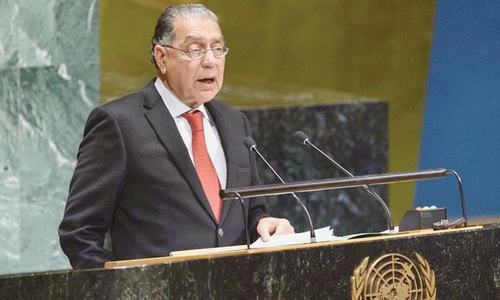Prime Minister Imran Khan on Wednesday said he was "pleased" over Pakistan's re-election to the United Nations Human Rights Council for a fifth time and vowed that the country would continue to raise its voice "against Islamophobia and in support of mutual respect".
Pakistan has been elected to the UN body for a three-year term.
In a series of tweets, the premier said that Pakistan was committed to uphold human rights for all and would work towards "advancement of tolerance and constructive engagement". He said that as an HRC member, Pakistan will also continue to "expose" the human rights violations by the Indian forces in occupied Kashmir.
The prime minister further said that Pakistan will continue its efforts towards consensus building and ensuring that HRC’s work is "guided by principles of universality, impartiality, dialogue and cooperation".
PM Imran also lauded the efforts made by the Foreign Office and Pakistan's overseas missions that led to "yet another diplomatic achievement". He said that the efforts of FO and overseas Pakistani missions have "enhanc(ed) Pakistan’s profile and recognition on the international stage".
Unique opportunity

Earlier, Foreign Minister Shah Mahmood Qureshi had said that Pakistan's re-election to the HRC has provided a unique opportunity for highlighting the Kashmir issue.
Speaking to the media, the foreign minister said that there was a communications blockade in the occupied valley while independent observes don't have access to the region. "So, this is a forum that can become the voice [of the Kashmiris]."
Asked about Pakistan’s priorities as a member of the UN body, Qureshi said that there should be four priorities; the Kashmir issue, the rise of Islamophobia, “Muslim causes” and human rights.
He said that the Kashmir issue was currently ongoing and the voice of the people was being suppressed. “Pakistan wants to send a clear message through this forum that we will not let the voice [of the Kashmiris] be suppressed and will continue to provide moral, diplomatic and political support to them."
In an earlier statement carried by Radio Pakistan, the minister had termed Pakistan's re-election an "important diplomatic achievement". He said that Pakistan was supported by every region in its re-election while influential and important countries had also backed the country's bid.
He added that the vote vouched for Pakistan's performance in the council over the past three years, adding that the country's role was now being recognised by the world. Qureshi said human rights violations were increasing in occupied Kashmir and becoming a part of the UN body at this critical juncture was a big achievement, the report said.
In a tweet late night on Tuesday, the foreign minister said the re-election was "a manifestation of the international community’s confidence and trust in Pakistan’s commitment to a progressive national & global human rights agenda."
Among the five candidates from the Asia-Pacific region vying for four seats, Pakistan secured the highest number of votes.
Pakistan has been serving on the council since January 2018. With Tuesday’s re-election, Pakistan will continue as a member for another three-year term commencing on Jan 1, 2021.
“The international community has once again reposed confidence in Pakistan, recognising our contribution to the national and global human rights agenda and strong credentials as a consensus builder in the HRC,” said a statement issued by Pakistan’s Permanent Mission to the UN in New York.
“Pakistan remains firmly committed to upholding, promoting and safeguarding human rights and fundamental freedoms for all,” it added.
The HRC has been a prominent forum for discussing the gross and systematic human rights abuses being perpetrated in Indian Illegally Occupied Jammu and Kashmir.
“Pakistan will remain actively engaged with the council as well as its related processes to continue to highlight the plight of Kashmiris and other oppressed people all over the world,” the Pakistani mission said.
China and Russia win seats, Saudis lose
China, Russia and Cuba also won seats on the UN's premier human rights body despite opposition from activist groups over their abysmal human rights records, but another target, Saudi Arabia, lost.
Russia and Cuba were running unopposed, but China and Saudi Arabia were in a five-way race in the only contested race for seats on the council.
In secret-ballot voting in the 193-member UN General Assembly on that race, Uzbekistan received 164 votes, Nepal 150, China 139 and Saudi Arabia just 90 votes. In 2016, the Saudis won a seat with 152 votes.
Despite announced reform plans by Saudi Arabia, Human Rights Watch (HRW) and others strongly opposed its candidacy saying the Middle East nation continues to target human rights defenders, dissidents and women's rights activists and has demonstrated little accountability for past abuses, including the killing of Washington Post columnist and Saudi critic Jamal Khashoggi in the Saudi consulate in Istanbul two years ago.
Under the council's rules, seats are allocated to regions to ensure geographical representation. Except for the Asia-Pacific contest, the election of 15 members to the 47-member body was all but decided in advance because all the other regional groups had uncontested slates.
Four countries won four Africa seats: Ivory Coast, Malawi, Gabon and Senegal. Russia and Ukraine won the two East European seats. In the Latin American and Caribbean group, Mexico, Cuba and Bolivia won the three open seats. And Britain and France won the two seats for the Western European and others group.
"Saudi Arabia's failure to win a seat on the Human Rights Council is a welcome reminder of the need for more competition in UN elections,” HRW's UN director, Louis Charbonneau, said after the results were announced.
"Had there been additional candidates, China, Cuba and Russia might have lost too,” he said. "But the addition of these undeserving countries won't prevent the council from shining a light on abuses and speaking up for victims. In fact, by being on the council, these abusers will be directly in the spotlight."














































